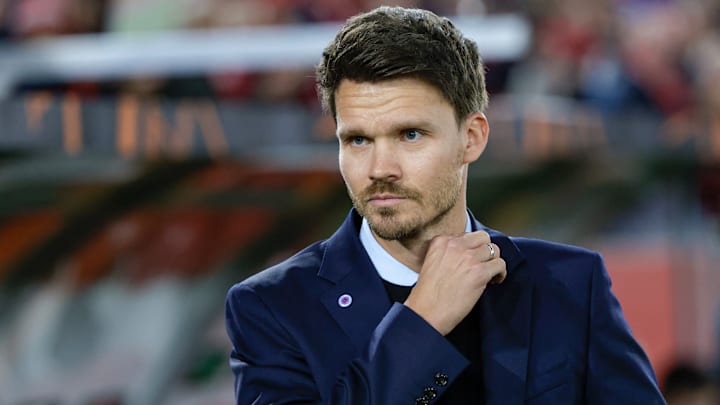Danny Röhl’s first match in charge ended in a harsh 3–0 defeat to Norwegian side Brann in the UEFA Europa League.
It exposed the long-standing structural and psychological issues rather than anything directly attributable to the new head coach.
With only two days on the training ground, he inherited a broken system rather than stamped his own one on the side. That said, the performance still provided some major insights into the work ahead.
Here are the key takeaways from a grim night in Bergen:
Chermiti Desperately Needs a Goal
Yousef Chermiti looks like a striker trapped somewhere between effort and anxiety.
The £8m signing is clearly trying to force a breakthrough, but it is manifesting as snatched touches, rushed decisions and poor execution.
His early link play was sloppy, his first touch erratic, and his header on 31 minutes was weak and straight at the goalkeeper. Worse still, when a cross fizzed across goal shortly after, he slowed instead of attacking the back post with conviction.
His mentality appears shot. Röhl may need to strip things back and rebuild him with confidence, perhaps even via rotation or a simpler role, because right now he is playing like someone waiting to fail.
Meghoma is not at European level
Jayden Meghoma has shown promise domestically, but the step up to European football exposed his inexperience.
The Brentford loanee repeatedly needed covering help from left winger Djeidi Gassama, who was pulled deeper than intended and nullified as an attacking outlet for large spells of the first half.
Meghoma’s positioning, particularly under counter-pressure, was shaky, and his marking on Brann’s second goal was poor.
At just 19, he may grow into the role, but it won’t be at Ibrox and this was a reminder that youth development rarely follows a straight upward curve.
Rangers remain toothless in front of goal
This has been a recurring theme all season. Even when chances arise, Rangers lack composure and finishing conviction.
Passes in the final third are rushed or misjudged, crosses are overhit or float harmlessly, and when a clear opening emerges, it is frequently squandered.
Thelo Aasgaard’s air-swipe inside the box after great work from James Tavernier on 29 minutes summed it up, promising approach play, blunt execution.
Without greater sharpness and a focal point playing with belief, hope of progression in Europe is fantasy.
Deep blocks continue to paralyse Rangers
Brann defended compact and vertical, sitting deep and waiting for turnovers. Rangers, as they have been for years, particularly under Russell Martin, looked clueless when tasked with breaking down a low defensive line.
Possession drifted into sterile horseshoe passing across the back line, the midfield failed to penetrate between the lines, and any attempt at directness came too late.
Worse, slow recycling left them vulnerable to transitions, which Brann repeatedly exploited.
Set pieces: Still a weekly disaster
It feels like this could be copy-pasted every week: Rangers set pieces remain a major liability at both ends.
Deliveries in attacking areas lack pace or precision, allowing defences to clear with ease.
Defensively, the disorganisation is glaring. The second goal was a direct result of slack marking, with both Nasser Djiga and Meghoma losing track of movement in the box.
For a team struggling in open play, set pieces should be a platform; instead, they are a recurring source of damage.
In Röhl’s defence: This one isn’t on him
It would be delusional to pin this on Röhl. The German has had two days to assess and select a squad desperately low on confidence, identity and structure.
He stepped into a tactical culture with no time to implement his own. This was not a verdict on his tenure; it was an unfiltered look at the scale of the salvage job he has inherited.
Sunday against Kilmarnock, not Bergen, will be the first genuine indicator of what a Röhl team might look like.
Röhl’s debut wasn’t a fresh chapter, it was a stark diagnosis. Now comes the treatment.
